Google announced in 2019 that podcasts would not surface in their search results, and its indexing would return to the audio content. Since then, the term and the need for podcast SEO have grown among podcast hosts, marketers, and SEO professionals.
So, if you have been wondering what search engine podcast is, how it can help your episodes appear in the top searches, the tactics to optimize the same, and everything else, stay with us.
In this article
Part 1. What is Podcast SEO?
SEO stands for search engine optimization. Your website, blog, and other pages can be found by brand-new visitors or lead if you have optimized your pages for search terms.
Like any other content, podcasts are also created to be successful and reach audiences worldwide. As such, podcast SEO refers to improving the visibility of your podcasts in search engine results pages (SERPs).
Part 2. Why Does Google Show Podcasts in SERPs?
Over the years, podcasts have become an essential form of media content that covers various topics to be discussed, ranging from learning new skill sets, current affairs, music, comedy, and much more.
However, podcast hosts have found it challenging to promote their audio content. Not to mention making their podcasts more reachable around the world.
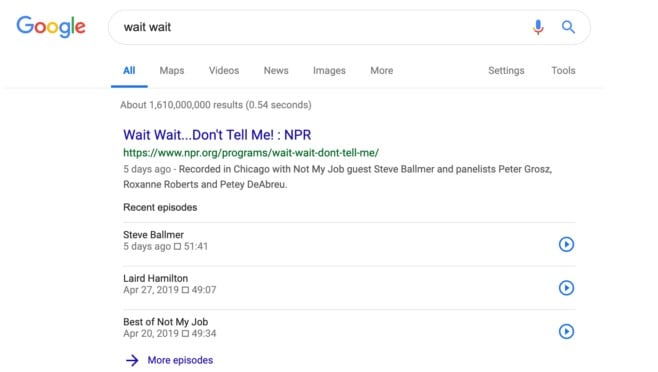
Considering this struggle of the podcasters, Google in the year 2019 announced that podcasts can now be indexed in SERPs. New promotion opportunities thus opened for all podcast creators and marketers.
Similarly to how videos are being searched, podcasts can also be displayed in desktop and mobile search results. Moreover, SERPs allow podcast episodes to be played without switching to another page by showing them as featured snippets. Thus, it is much easier for people to look for, and discover the podcast by simply a relevant keyword.
Part 3. Podcast SEO Tips: How to Optimize Your Content
If you want your podcasts to rank high on SERPs and get organic traffic, you need to optimize them smartly. Here are some podcast SEO tips you can use, and we've shortlisted the best.
1. Keeping an eye on the trends
To ensure your podcast is searchable on Google, it has to be in line with the latest and trending topics. Though you can always have podcasts on different topics, focussing on the latest trends will surely help you get higher ranks in search engine results.

2. Transcription matters
Another vital factor to be considered for podcast SEO is transcription. When the audio file is scanned, the podcasts episodes transcriptions are done by Google. However, to have complete control over the translation, transcribing audio to texts is suggested.
While transcribing podcasts, you can consider several factors like correct terminology, relevant terms, the right keywords, and more. With the right transcription, the accessibility of the podcast increases.
One Windows and Mac-based software that can help you with this task is Wondershare Filmora. Its Speech to Text feature and other related functions help create and optimize your podcasts.
- Speech To Text (STT): Transcribe your voice to subtitles in several languages.
- AI-based Silence Detection: remove moments of silence from the podcast with one click.
- Audio Visualizer: enhance your podcast episodes through audio-visualizing effects.
- Audio Effects: more than 50 audio effects can be added to your podcasts.
How to use Filmora to transcribe
Step1 Launch the software and choose Speech to Text Function
Launch the Filmora software on your system. To use the Speech-to-Text feature, the software allows you to access it in 4 different ways.
- At the timeline, choose the audio asset, tap on the Tools options from the top menu, and select Audio > Speech to Text.
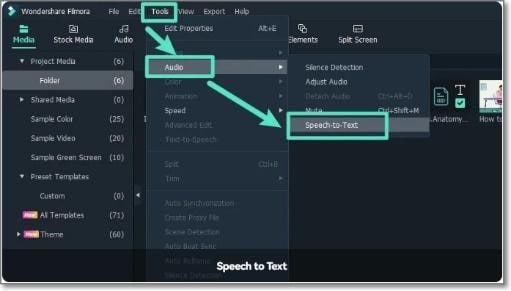
- At the Media resource area, choose the video or the Audio with the audio track, right-click and then choose the Speech to Text option.
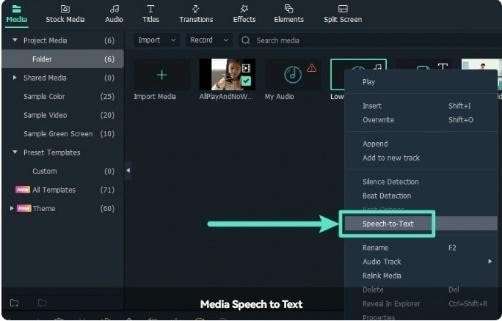
- At the timeline, choose the audio asset, and then tap on the Speech to Text icon from the toolbar. (The option will appear only when there is a supported file type).
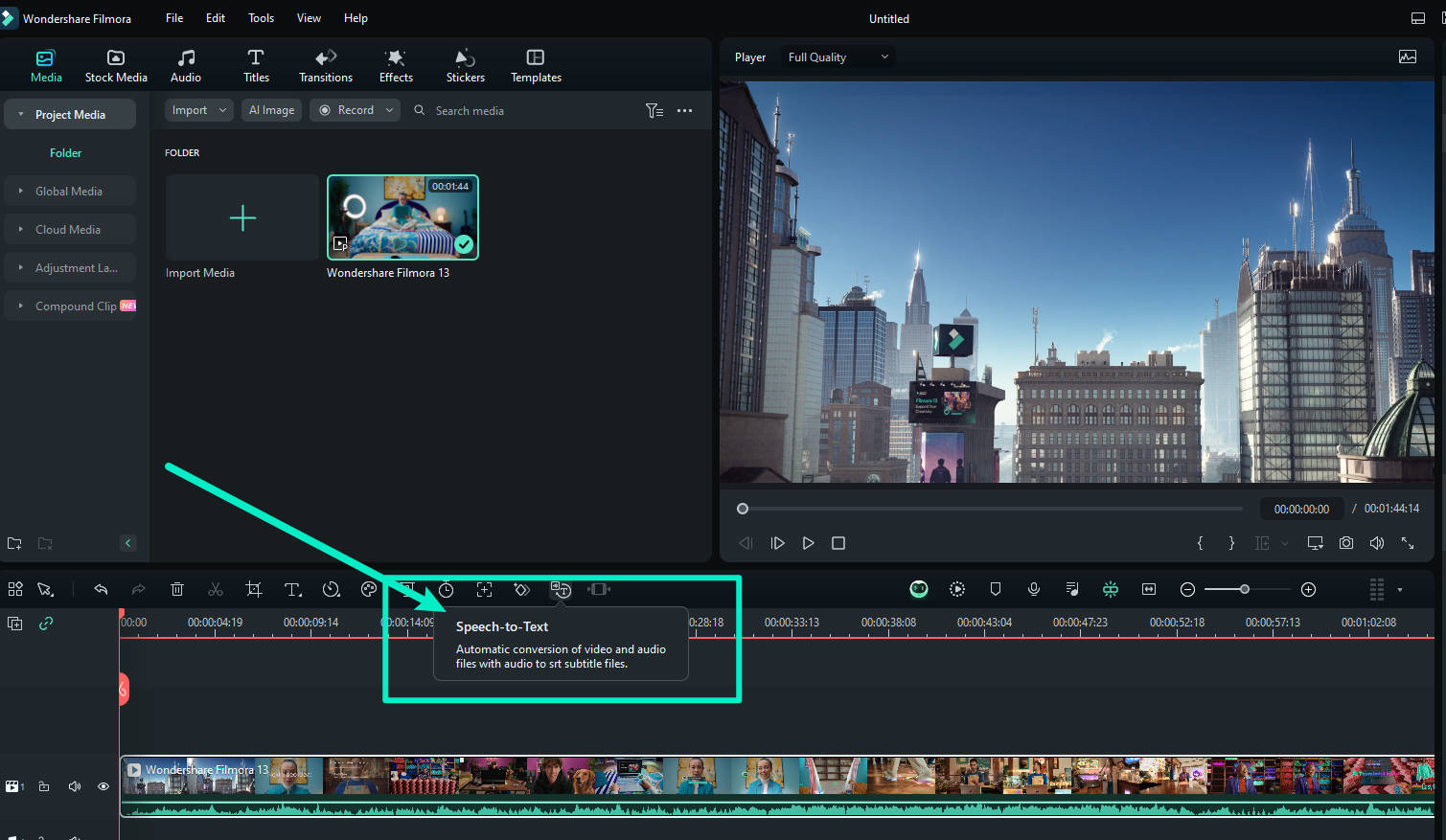
- At the timeline, choose the audio asset, right-click on it and then choose the Speech to Text option.
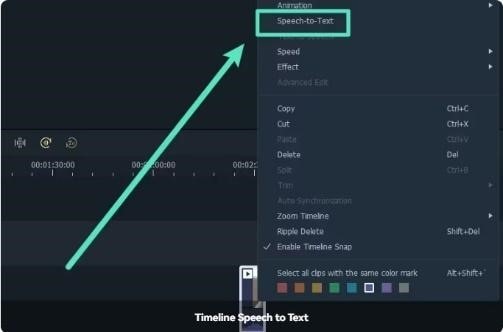
Step2 Make parameter settings
Next, at the parameter setting bar of STT, choose the audio language in which you want the text to be converted. Also, select the files that have to be converted. Also, check the option to match the timeline automatically.
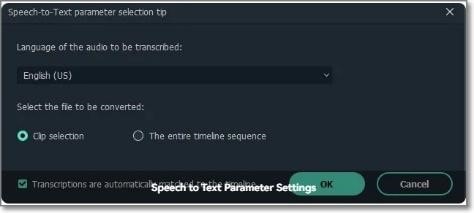
Step3 Task list and file generation
Once the transcoding and transcription are complete, a task list will be displayed with the first imported file at the top. Sliding it up and down is supported. The file that is generated will now be displayed in the SRT format.
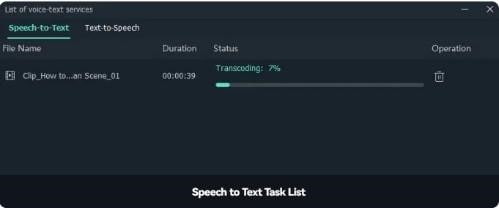
3. Add relevant keywords
After getting the transcription, keywords are the next to think about. Keywords are like the lifeline to any content, and podcast is no exception. So, adding the relevant keywords related to your topic and the ones commonly searched by the user will help you rank higher in the search results.
Spend some time and research to find the relevant keywords for your podcasts, and for a help of professional keyword generators can also be taken. Some popular ones that can be considered are Google Keyword Planner, Semrush, Google Search Console, SECockpit, and more.
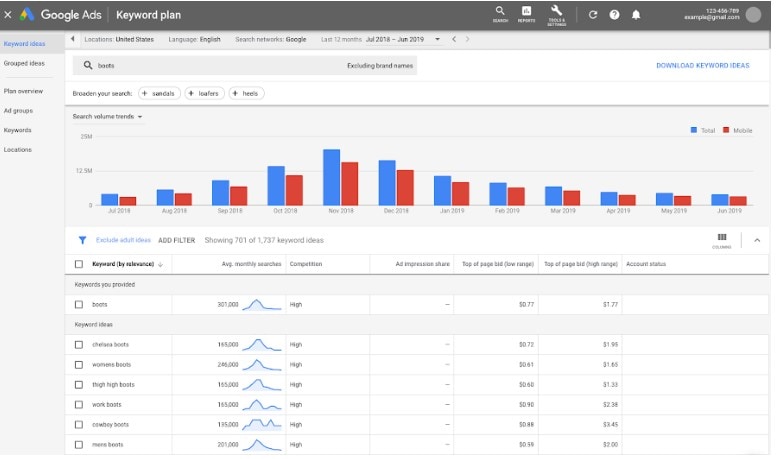
Besides finding the keywords, their right placement is also critical. In addition to the podcast name, the keywords can be added to the titles, descriptions, etc. Also, keywords density and variants matter. Make sure not to use the same ones repeatedly in a single paragraph.
And using keyword variants will increase your reach and will also help you to avoid stuffing. For example, if the keyword is "video editors", then "video editing", "video makers", "editors for videos", etc., can all be inserted into your transcription. The keywords can also be added to the description and show notes.
4. Leveraging podcast metadata
Metadata helps in providing additional details about your content and is a useful tool for podcast SEO. The metadata appears after the title and provides the podcast episode information, like what the podcast is about, its content, and more.
Keywords can also be added to the metadata. With these details, the search engines can get a quick understanding of your content and topic and thus help in better search and ranking.
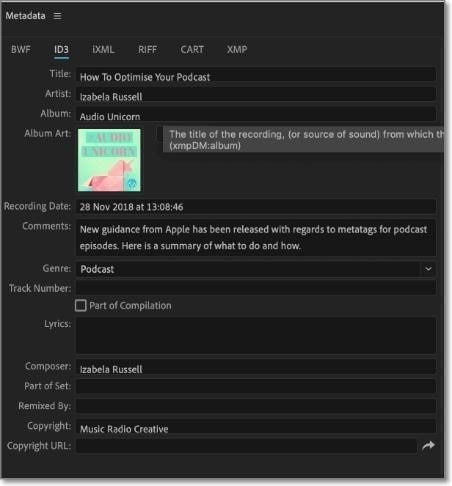
5. Authoritative quality content
Google always promotes the content that it founds to be authoritative; for this, the Google algorithm should recognize you as the leader in the industry. To match up with the Google algorithm, you need quality content that offers useful and correct information and appeals to the audience.
So, lay your major focus on the quality content rather than the quantity to establish yourself as the leader. Thus, authoritative quality control is another effective podcast SEO technique.
6. Link and promote on social media
You can increase your podcast's exposure and reach by cross-promoting it on social media platforms. With your content on social media sites, your chances of getting discovered and found by different search engines increase.
Plan your social media strategy based on your topic and the target audience to get maximum shares, likes, and comments. With your podcasts appearing on multiple channels, chances of getting pulled by Google on search engine results increase.
You can promote your podcasts on social media sites like Facebook, Instagram, Twitter, and others and convert them to be fit for YouTube as a downloadable e-book, blog post, and more.

7. Make a website or a page for your podcast
Creating a website or dedicated page for your podcast is unnecessary, but it certainly boosts its SEO. With a desiccated page, you will be able to enhance the online footprint of your podcasts, and thus chances of it getting a good rank in search engine results increase.
So, with a website, you can reach the audience through text content besides audio content. A website also helps you create an email list to grow the target audience.
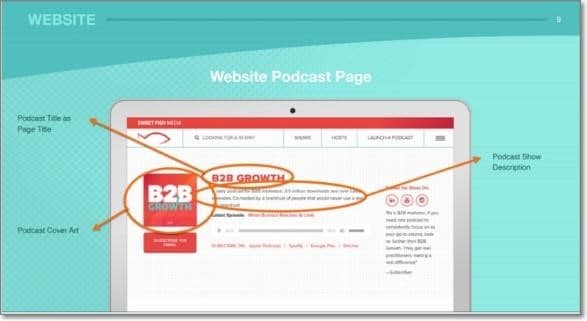
8. Create backlinks
Any content SEO strategy relies heavily on backlinks, and podcasting is no different. These are the links from the external websites that reach one of your podcast's episodes or pages.
Several tactics can be employed for link building, like asking for reviews, appearing on other podcasts as the guests, linking your episodes to a list of the industry podcasts, and more. Then, when Google sees that additional pages and sites have backlinks to your podcast content, it recognizes you as authoritative and thus pulls it on the search engines.

9. Set up Google Podcast Manager
The Google Podcast Manager is a versatile tool by Google that helps you in several different ways. Using the app, you can access podcast performance data like minutes played, top search items, subscriber counting, and more. The tool also helps you index podcasts and verify with the platform Google. Finally, the tool also assists you in increasing your reach to devices and platforms like Google Assistant and Google Home.
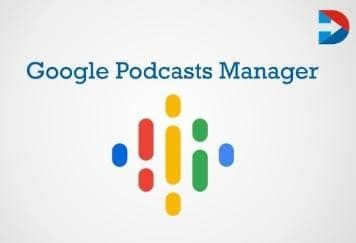
10. Use keywords for planning your episodes
Creating podcast episodes around the targeted keywords is an effective way for podcast SEO. Creating the episodes based on the keywords helps place the keywords more effectively and build quality content.

So here are all the tips and techniques. They work best as SEO podcasts for beginners as well as pros.
Part 4. Why Is My Podcast Not Showing on Google?
So now you have the podcast ready and employed the best SEO practices, but still, Google is not showing your podcast? No need to worry. There might be several reasons for this. So, if your podcast is not appearing in Google Podcasts or Google Search, the following are the most probable reasons.
1. See if the feed is indexed
For a podcast to appear on any Google platform, it must be indexed, meaning it should be found, read, and stored on the RSS feed. So below are the reasons why the feed could not be found.
- If the feed is published for the first time, it might take around 6 days to appear on the Google podcasts.
- Ensure that the feed exists and also at the URL provided.
- Make sure that robots do not block the feed.txt.rule.
- You can also check when Google visited your RSS feed last time.
2. Check for the RSS feed validity
For podcasts to appear on Google, you need to check for the validity of the RSS feed. Check for the following.
- Check for validity: To check if the feed is well formed, the RSS validator should be used to validate it using UEL and not the code.
- Check for completeness: The feed should include all the podcast-level tags needed by Google. Also, one episode having the episode tags must be included.
- Feed is not blocked: If there are any blocking tags on your feed, they will not appear on Google. The blocking tags that you need to check are:
<itunes:block>yes</itunes:block>
<googleplay:block>yes</googleplay:block>
3. Google can access the feed and homepage
Getting your podcast listed on Google requires that Google can access both the feed and the homepage. The Podcasts Manager might take a day to fix an inaccessible or broken feed, so be patient.
Final Words
With podcasts now appearing on SERP, the option for wider reach and growth opportunities has increased. So, use the best podcast SEO practices for your podcast to get high ranks and more followers.




